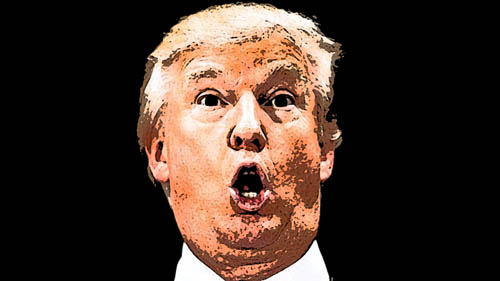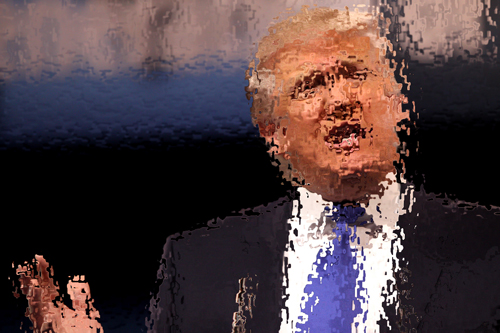At least, that’s what Trump seems to want — he wants the midterms to be all about him. I suspect Democrats agree. Republicans, maybe not so much.
President Donald Trump‘s strategy of becoming aggressively involved in the midterm elections is prompting concern among some Republicans who worry he’s complicating the political calculus for GOP candidates trying to outrun his popularity.
Those Republicans worry their statewide candidates may rise or fall based on Trump’s standing, muddling their path to maintain control of Congress.
But Trump has no plans to step out of the spotlight. …
The president is casting himself as the star of the midterms, eagerly inserting himself into hotly contested primaries, headlining rallies in pivotal swing states and increasing his fundraising efforts for Republicans. Last week, Trump agreed to donate a portion of his reelection fund to 100 GOP candidates running in competitive House and Senate races.
He’s expected to be even more aggressive in the fall. White House officials say he’s reserving time on his schedule for midterm travel and fundraising likely to surpass that of former presidents George W. Bush and Barack Obama.
“This is now about Donald Trump,” said Al Cardenas, a former Florida Republican chairman. “It’s a high-risk, high-stakes proposition.”
There’s a special election for a U.S. congressional seat in Ohio on Tuesday that may give us another clue how the midterms will go. It’s in a district that’s been reliably Republican for a long time, and even more so since it was gerrymandered into a mostly white exurban district in 2010. Trump won the district in 2016 by 11 points. But Monmouth says the special election is a toss-up between Republican Troy Balderson and Democrat Danny O’Connor.
Trump just held one of his signature unhinged rallies in a high school auditorium — with no air conditioning; someone on the staff will be in trouble – about 17 miles north of Columbus. It appears this was arranged on Trump’s initiative, not Balderson’s.
Ohio Gov. John Kasich (R) said Sunday that an Ohio House candidate did not invite President Trump to appear at his campaign rally on Saturday.
The governor and former GOP presidential candidate, who has been critical of Trump, told George Stephanopoulos on ABC’s “This Week” that GOP hopeful Troy Balderson told him that he didn’t have anything to do with inviting Trump.
“I asked him the other day ‘Why are you bringing Trump in,’ he said ‘well, I don’t have anything to do with it,’ †Kasich said, referring to Balderson, who is facing a tough challenge from Democrat Danny O’Connor in a district Trump won by double digits.
“I think Donald Trump decides where he wants to go, and I think they think they’re firing up the base,†Kasich added.
It’s also possible that Trump’s appearance in Ohio fired up the other base.
Ahead of the Saturday evening rally, some party strategists worried that it would do more harm than good for Balderson, who has campaigned as a mainstream figure. Their concerns were illustrated by a Monmouth University survey released earlier this week showing Trump’s approval at just 46 percent in Ohio’s 12th District, which stretches from the traditionally moderate Columbus suburbs to more conservative rural areas.
Indeed, at many points at Saturday, Trump seemed more focused on revisiting his greatest hits than on Tuesday’s special election. He slashed the media (“MSNBC is so corrupt, is so disgusting”), went after political rivals (recently ousted South Carolina Rep. Mark Sanford, he joked, “likes flamingo [sic] dancers from Argentinaâ€), and ripped the Russia investigation.
Well, we’ll see on Tuesday how it turns out.
Some other factors that could impact the midterms:
Brent Budowsky, writing for The Hill, predicts that there will be an “obstruction of justice bombshell” before the midterms. “…Â odds are very high that Mueller will offer a declarative public statement before the midterm elections, and very likely before Labor Day, that the president is guilty of obstruction of justice,” says Budowsky.
The gender gap is huge and possibly historic, according to the nerds at fivethirtyeight.
See Jennie Neufeld at Vox: Republicans have begun to sever ties with the Koch brothers. It isn’t just Trump and Steve Bannon; the RNC itself is souring on the Kochs. “Republicans have won more elections at every governmental level than they have since the 1920s partly due to the Kochs’ immense support,” Neufeld writes. “The Kochs were going to donate $400 million to various GOP campaigns in the midterm elections; it’s unclear if this feud will change those plans.”
For your reading pleasure, see David Atkins, Does Trump Even Understand What He Did Wrong?
Even the briefest observation of Donald Trump is adequate to confirm that he is not a man of profound intellect. He certainly possesses his share of social intelligence, a knack for salesmanship and an obsessive drive to dominate and humiliate others stemming from a yawning maw of overlapping insecurities. But in terms of how we traditionally measure intelligence in the modern developed world–the acquisition of knowledge over time and the ability to process, digest and act cogently in response to complex information–Trump probably doesn’t even reach the 50th percentile of Americans. And that is being generous.
This basic fact is difficult to keep in mind when assessing his decisions because we have never had a president like this. Society tends to dramatically overestimate the talent and intelligence of those fortunate enough to be rich and powerful, but rarely are they as objectively ignorant and lacking in basic competency as Trump. Far too often we look for a schema or strategy behind Trump’s actions, only to discover that his decisions were precipitated by the dumbest of reasons: because he saw a Fox News segment that made him angry, or because he heard that Barack Obama had originated a policy, because some extraneous person mentioned some falsehood to him that he was credulous enough to believe, or because he was openly bribed. This principle has become known as “Trump’s Razor“: when seeking to understand the president’s behavior, look for the stupidest possible reason.
Atkins argues that “it’s entirely possible that at a moral level and, crucially, at a legal one, he simply isn’t smart enough to grasp the enormity of the crimes he and his associates seem to have committed.” If so, we can count on Trump continuing to make one blunder after another to “defend” himself.
Update: See also emptywheel on why Trump’s conspiracy trial is going to be awesome.






